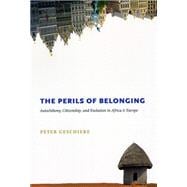
Note: Supplemental materials are not guaranteed with Rental or Used book purchases.
Purchase Benefits
What is included with this book?
Peter Geschiere is professor of African anthropology at the University of Amsterdam and the author of The Modernity of Witchcraft: Politics and the Occult in Postcolonial Africa.
| Preface and Acknowledgments | p. ix |
| Introduction: Autochthony-the Flip Side of Globalization? | p. I |
| A Primordial yet Global Form of Belonging? | p. 2 |
| Autochthony's Genealogy: Some Elements | p. 6 |
| Autochthony Now: Globalization and the Neoliberal Turn | p. 16 |
| Autochthony and the Tenacity of the Nation-State | p. 21 |
| Historical Construction, Political Manipulation and Emotional Power | p. 26 |
| Approach: From Identity to Subjectivation and Aesthetics | p. 31 |
| Chapter Overview | p. 35 |
| Cameroon: Autochthony, Democratization, and New Struggles over Citizenship | p. 39 |
| Belonging to a Nonexistent Province | p. 41 |
| Elite Associations and Autochthony: Different Degrees of Citizenship? | p. 43 |
| The "Sea People" Protected by the New Constitution | p. 49 |
| Debates in the Cameroonian Press | p. 53 |
| Autochthony's "Naturalness": The Funeral as a Final Test for Belonging | p. 55 |
| A Tortuous History | p. 57 |
| An Empty Discourse with Segmentary Implications | p. 63 |
| Conclusion | p. 64 |
| Cameroon: Decentralization and Belonging | p. 66 |
| The East and the New Importance of the Forest | p. 69 |
| The New Forest Law | p. 72 |
| Participation in Practice | p. 74 |
| The Elusive Community | p. 76 |
| The Community as Stakeholder: Belonging and Exclusion | p. 81 |
| Village or Grande Famille? | p. 83 |
| The Halfhearted Belonging of the External Elites | p. 86 |
| Discovering Allogenes at Ever Closer Range | p. 89 |
| Conclusion | p. 94 |
| African Trajectories | p. 97 |
| Ivory Coast: Identification and Exclusion | p. 98 |
| Elsewhere in Africa | p. 117 |
| "Pygmy" Predicaments: Can Only Citizens Qualify as Autochthons? | p. 124 |
| Autochthony in Europe: The Dutch Turn | p. 130 |
| The Dutch Switch: From Multiculturalism to Cultural Integration | p. 134 |
| Overview: How the Netherlands Became an "Immigration Country" | p. 137 |
| National Consensus and Its History-the Dutch Way | p. 139 |
| Alternative Solutions | p. 142 |
| A More Forceful Integration | p. 144 |
| Allochtonen: A New Term on the Dutch Scene | p. 147 |
| Elusive Autochthony | p. 153 |
| History and Culture | p. 155 |
| Comparisons | p. 162 |
| Cameroon: Nation-Building and Autochthony as Processes of Subjectivation | p. 169 |
| Nation-Building as an Everyday Reality | p. 172 |
| Rituals of Belonging: The Funeral at Home as a Celebration of Autochthony | p. 190 |
| Epilogue: Can the Land Lie? Autochthony's Uncertainties in Africa and Europe | p. 212 |
| Varying Patterns of Nation-Building in Africa and Their Implications | p. 213 |
| Autochthony and the Search for Ritual in Europe | p. 218 |
| Notes | p. 225 |
| Bibliography | p. 263 |
| Index | p. 279 |
| Table of Contents provided by Ingram. All Rights Reserved. |
The New copy of this book will include any supplemental materials advertised. Please check the title of the book to determine if it should include any access cards, study guides, lab manuals, CDs, etc.
The Used, Rental and eBook copies of this book are not guaranteed to include any supplemental materials. Typically, only the book itself is included. This is true even if the title states it includes any access cards, study guides, lab manuals, CDs, etc.